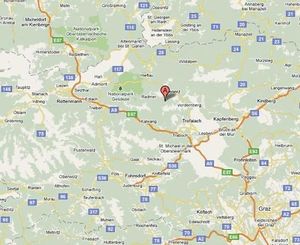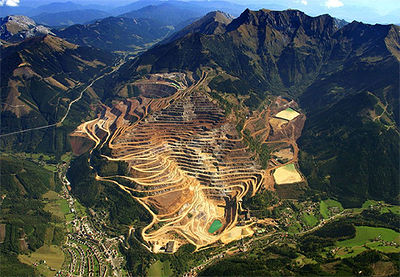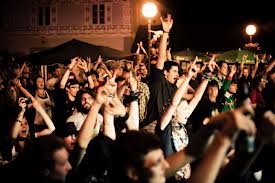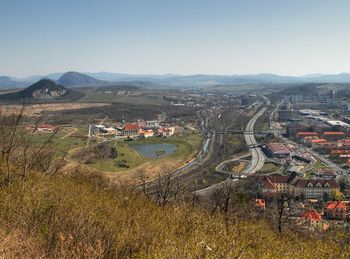Students:Group Four: Robert, Lucie Č, Jana P & Jana M: Difference between revisions
No edit summary |
No edit summary |
||
| Line 1: | Line 1: | ||
[[File:Map of Eisenerz.jpg|300px|thumb|left|Map of Eisenerz, source: http://www.tripadvisor.co.uk]] | [[File:Map of Eisenerz.jpg|300px|thumb|left|Map of Eisenerz, source: http://www.tripadvisor.co.uk]] | ||
We started our fourth day by moving to Eisenerz, an old mining town in Upper Styria. | |||
== Workshop "Fisher Game" == | == Workshop "Fisher Game" == | ||
---- | ---- | ||
The first activity to take place after our arrival was a ‘Fisher game’. That is a systemic game which aims to show problems with use of common resources and time delay of complex system. | |||
We found the game very interesting and a bit ‘tricky’. For us, the most beneficial aspect of the game was that it (similarly as workshop “Monologue/Dialogue”) proved the importance of communication. Before we were allowed to communicate with other ‘fishing enterprises’, the amount of fish had been rapidly decreasing. Once we started to talk to other groups we were able to increase the fish stock again. It worked for two rounds. Then, we somehow stopped ‘negotiating’ which was a crucial mistake as most of the groups started to behave selfishly again. | |||
We realized that if we would be able to communicate more efficiently, we might develop the most efficient strategy which Marlene showed us afterwards (no fishing for every first year and fishing of 8 % for every second year). That constitutes an incentive for us to train our communication skills and try to reconsider our mental models. | |||
| Line 9: | Line 16: | ||
---- | ---- | ||
After a very tasty lunch we attended two presentations about old mining regions in Austria and Czech Republic. Gerfried Tiffner talked about the city of Eisenerz, its problems and efforts to redesign it. Andrew presented the issues of Ústí n.L. mining region. | |||
[[File:Eisenerz 2.jpg|400px|thumb|right|Eisenerz, photo by Andreas Hollinek, source: http://www.oesterreich-info.at]] | [[File:Eisenerz 2.jpg|400px|thumb|right|Eisenerz, photo by Andreas Hollinek, source: http://www.oesterreich-info.at]] | ||
[[File:Rostfest.jpg|400px|thumb| | It was interesting to engage in the problem of a ‘dying city’ and hear about the various strategies to fight its ‘disease’. We consider the social-psychological dimension of the problem as probably the most difficult one. Convincing the old people to leave their homes and resettle and attract youth to stay in the city must be a long and hurting process. However, as this has been quite successful so far, we believe that the future of the city is promising. There are good opportunities for tourism and the projects put in place (e.g. Rostfest) seem to be very creative and beneficial. | ||
[[File:Rostfest.jpg|400px|thumb|right|Rostfest 2012, source: http://www.eisenerz-art.at]] | |||
Andrew told us a lot of remarkable facts about both Czech history and present which surprised many of us unpleasantly. On the other hand, a few innovative and successful revitalization projects partly improved ‘the image’. We were thinking about the issues of breaching the mining limits. From our perspective, it is useless to destroy other settlements or factories in order to enable mining in the region to continue until 2072 or even 2113. The discussion about energy security is moving onward fast and a gradual abandonment of coal power plants is a probable option to be put in place in upcoming years or decades. Therefore, we are convinced that investments to promoting renewable energy sources and creating new job opportunities in other sectors (together with requalification of the people) in the region would be much more sustainable and forethoughtful choice. | |||
[[File:Most.jpg|350px|thumb|left|City of Most, source: http://www.stavebni-forum.cz]] | |||
== Visit to the city of Eisenerz == | |||
---- | |||
The last activity scheduled on Thursday was a visit to the city of Eisenerz itself. The walk around the town surprised us quite a lot as there were not many signs that would show the problems of the city. Most of the buildings seemed to be in a good condition, although many of them were reportedly vacant. There were also a few of nice shops and some interesting historical buildings like a castle, a town hall or a church. We only regretted a bit that we had not managed to visit the mine itself. But never mind, next time we will :-). | |||
Revision as of 23:21, 12 September 2013

We started our fourth day by moving to Eisenerz, an old mining town in Upper Styria.
Workshop "Fisher Game"
The first activity to take place after our arrival was a ‘Fisher game’. That is a systemic game which aims to show problems with use of common resources and time delay of complex system.
We found the game very interesting and a bit ‘tricky’. For us, the most beneficial aspect of the game was that it (similarly as workshop “Monologue/Dialogue”) proved the importance of communication. Before we were allowed to communicate with other ‘fishing enterprises’, the amount of fish had been rapidly decreasing. Once we started to talk to other groups we were able to increase the fish stock again. It worked for two rounds. Then, we somehow stopped ‘negotiating’ which was a crucial mistake as most of the groups started to behave selfishly again.
We realized that if we would be able to communicate more efficiently, we might develop the most efficient strategy which Marlene showed us afterwards (no fishing for every first year and fishing of 8 % for every second year). That constitutes an incentive for us to train our communication skills and try to reconsider our mental models.
Workshop about the challenges of old mining regions
After a very tasty lunch we attended two presentations about old mining regions in Austria and Czech Republic. Gerfried Tiffner talked about the city of Eisenerz, its problems and efforts to redesign it. Andrew presented the issues of Ústí n.L. mining region.

It was interesting to engage in the problem of a ‘dying city’ and hear about the various strategies to fight its ‘disease’. We consider the social-psychological dimension of the problem as probably the most difficult one. Convincing the old people to leave their homes and resettle and attract youth to stay in the city must be a long and hurting process. However, as this has been quite successful so far, we believe that the future of the city is promising. There are good opportunities for tourism and the projects put in place (e.g. Rostfest) seem to be very creative and beneficial.

Andrew told us a lot of remarkable facts about both Czech history and present which surprised many of us unpleasantly. On the other hand, a few innovative and successful revitalization projects partly improved ‘the image’. We were thinking about the issues of breaching the mining limits. From our perspective, it is useless to destroy other settlements or factories in order to enable mining in the region to continue until 2072 or even 2113. The discussion about energy security is moving onward fast and a gradual abandonment of coal power plants is a probable option to be put in place in upcoming years or decades. Therefore, we are convinced that investments to promoting renewable energy sources and creating new job opportunities in other sectors (together with requalification of the people) in the region would be much more sustainable and forethoughtful choice.

Visit to the city of Eisenerz
The last activity scheduled on Thursday was a visit to the city of Eisenerz itself. The walk around the town surprised us quite a lot as there were not many signs that would show the problems of the city. Most of the buildings seemed to be in a good condition, although many of them were reportedly vacant. There were also a few of nice shops and some interesting historical buildings like a castle, a town hall or a church. We only regretted a bit that we had not managed to visit the mine itself. But never mind, next time we will :-).